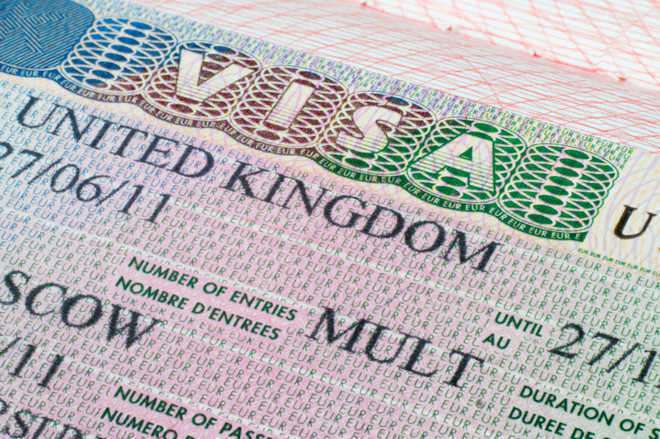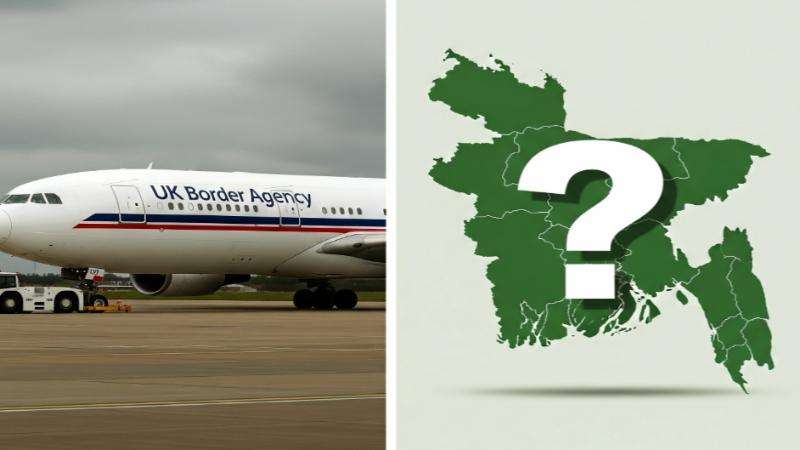
A select few UK colleges are allowing overseas students to enrol early in the winter semester in order to escape the effects of the visa reforms that would make it impossible for dependents to join them starting in January 2024.
While some colleges have offered November beginnings for a while, others have developed a new intake just for 2023.
A "second" postgraduate intake is customarily opened in the UK in January to add spots for candidates on some of the most sought-after taught programmes, such as business, management, or computer science degrees.
Particularly for students from the Southern Hemisphere or who were unable to get a visa in time for an autumn start, this off-track admission has been a significant catalyst for development in international recruiting.
However, the UK government's decision to forbid applicants from taking family members with them as dependents will now effect January 2024 and beyond.
A fresh December intake has been added by the University of Law for various postgraduate programmes beginning in 2023.
In order to fill the gap between the January intake and the course-specific content, students will be required to take an additional general module on academic study habits.
According to the University of London website, students can enrol in this degree in December 2023 and have access to an additional module on academic and professional practise that will help them be ready for postgraduate study and improve their professional abilities.
It noted that the dates have not been set to allow international students to bring dependents with them, highlighting that it is offering January starts as well – the same as previous years.
The new November date is part of a strategy for growing international student numbers sustainably, through staggered starts, it said, adding that the intakes are open to both UG and PG students, the former of which have never had the right to bring dependants.
Teesside University’s London campus based in Queen Elizabeth Olympic Park in Stratford also offers a limited number of courses starting in November, although the website chatbot informs prospective international students that they will “need to apply using an agent in your country”.
The University of Bedfordshire has been offering a November intake since 2016 and a website course finder returns 45 postgraduate courses with a November start including masters degrees in law, business, computing, engineering, economics and tourism.
The University of Bedfordshire says there has been no significant change in applicant behaviour in relation to November demand.
In July, The PIE News reported on Nigerian students rushing to secure places before dependants ban, with Jamie Hastings, director of My International Office describing students as ‘scrambling’ to secure places in September.
It remains to be seen if this demand will now shift to the smaller number of November and December start dates being offered in the market.
Flexibility on course start dates is seen as an attractive proposition for international students and is being increasingly adopted by modern institutions.
Private universities such as BPP and UA92 operate rolling-admissions systems that allows students to join every few months.
According to HESA data, BPP featured as the third biggest recruiter from markets associated with a higher number of dependants connected to student visas. In 2021/22, the university recruited 5,400 students from across Nigeria, India, Pakistan, Bangladesh and Sri Lanka.
In the summer of 2020, Coventry University famously created a July intake to allow students from the European Union to enrol ahead of drastic changes to their fee status. Due to the impact from Brexit students were due to transition from Home fee status to full international fees in the following September.
Students who were able to enrol at Coventry two months ahead of time avoided this significant price hike. They were required to take an online module that bridged the gap to when they were due on campus in the autumn.
The move was widely seen as a success although in cases, certain EU nationalities did not receive their high school examination results or leaving certificates in time to be enrolled so early in the summer.
At the time some stakeholders questioned the legality of such a move, although it is unclear if the Office for Students were required to sanction new intakes.
Similar questions may be raised with any university introducing a new winter intake at this late stage.
The PIE News understands that several institutions have been considering introducing a November 2023 intake while monitoring applications to see if there is a shortfall related to dependant visa changes.
Buoyant numbers for the January intake however, have dissuade many from this course of action, although it remains to be seen if students are completely aware of the rule changes on the ground in key source markets.
A spokesperson for Teesside University London said: “Teesside University London has implemented an innovative new delivery model and we will have three intakes of students, both undergraduate and postgraduate, from September, November and January. This is part our long-term strategy and reinforces our drive to provide as much choice and flexibility as possible for all of our students across a diverse range of programs.”
 A select few UK colleges are allowing overseas students to enrol early in the winter semester in order to escape the effects of the visa reforms that would make it impossible for dependents to join them starting in January 2024.
While some colleges have offered November beginnings for a while, others have developed a new intake just for 2023.
A "second" postgraduate intake is customarily opened in the UK in January to add spots for candidates on some of the most sought-after taught programmes, such as business, management, or computer science degrees.
Particularly for students from the Southern Hemisphere or who were unable to get a visa in time for an autumn start, this off-track admission has been a significant catalyst for development in international recruiting.
However, the UK government's decision to forbid applicants from taking family members with them as dependents will now effect January 2024 and beyond.
A fresh December intake has been added by the University of Law for various postgraduate programmes beginning in 2023.
In order to fill the gap between the January intake and the course-specific content, students will be required to take an additional general module on academic study habits.
According to the University of London website, students can enrol in this degree in December 2023 and have access to an additional module on academic and professional practise that will help them be ready for postgraduate study and improve their professional abilities.
It noted that the dates have not been set to allow international students to bring dependents with them, highlighting that it is offering January starts as well – the same as previous years.
The new November date is part of a strategy for growing international student numbers sustainably, through staggered starts, it said, adding that the intakes are open to both UG and PG students, the former of which have never had the right to bring dependants.
Teesside University’s London campus based in Queen Elizabeth Olympic Park in Stratford also offers a limited number of courses starting in November, although the website chatbot informs prospective international students that they will “need to apply using an agent in your country”.
The University of Bedfordshire has been offering a November intake since 2016 and a website course finder returns 45 postgraduate courses with a November start including masters degrees in law, business, computing, engineering, economics and tourism.
The University of Bedfordshire says there has been no significant change in applicant behaviour in relation to November demand.
In July, The PIE News reported on Nigerian students rushing to secure places before dependants ban, with Jamie Hastings, director of My International Office describing students as ‘scrambling’ to secure places in September.
It remains to be seen if this demand will now shift to the smaller number of November and December start dates being offered in the market.
Flexibility on course start dates is seen as an attractive proposition for international students and is being increasingly adopted by modern institutions.
Private universities such as BPP and UA92 operate rolling-admissions systems that allows students to join every few months.
According to HESA data, BPP featured as the third biggest recruiter from markets associated with a higher number of dependants connected to student visas. In 2021/22, the university recruited 5,400 students from across Nigeria, India, Pakistan, Bangladesh and Sri Lanka.
In the summer of 2020, Coventry University famously created a July intake to allow students from the European Union to enrol ahead of drastic changes to their fee status. Due to the impact from Brexit students were due to transition from Home fee status to full international fees in the following September.
Students who were able to enrol at Coventry two months ahead of time avoided this significant price hike. They were required to take an online module that bridged the gap to when they were due on campus in the autumn.
The move was widely seen as a success although in cases, certain EU nationalities did not receive their high school examination results or leaving certificates in time to be enrolled so early in the summer.
At the time some stakeholders questioned the legality of such a move, although it is unclear if the Office for Students were required to sanction new intakes.
Similar questions may be raised with any university introducing a new winter intake at this late stage.
The PIE News understands that several institutions have been considering introducing a November 2023 intake while monitoring applications to see if there is a shortfall related to dependant visa changes.
Buoyant numbers for the January intake however, have dissuade many from this course of action, although it remains to be seen if students are completely aware of the rule changes on the ground in key source markets.
A spokesperson for Teesside University London said: “Teesside University London has implemented an innovative new delivery model and we will have three intakes of students, both undergraduate and postgraduate, from September, November and January. This is part our long-term strategy and reinforces our drive to provide as much choice and flexibility as possible for all of our students across a diverse range of programs.”
A select few UK colleges are allowing overseas students to enrol early in the winter semester in order to escape the effects of the visa reforms that would make it impossible for dependents to join them starting in January 2024.
While some colleges have offered November beginnings for a while, others have developed a new intake just for 2023.
A "second" postgraduate intake is customarily opened in the UK in January to add spots for candidates on some of the most sought-after taught programmes, such as business, management, or computer science degrees.
Particularly for students from the Southern Hemisphere or who were unable to get a visa in time for an autumn start, this off-track admission has been a significant catalyst for development in international recruiting.
However, the UK government's decision to forbid applicants from taking family members with them as dependents will now effect January 2024 and beyond.
A fresh December intake has been added by the University of Law for various postgraduate programmes beginning in 2023.
In order to fill the gap between the January intake and the course-specific content, students will be required to take an additional general module on academic study habits.
According to the University of London website, students can enrol in this degree in December 2023 and have access to an additional module on academic and professional practise that will help them be ready for postgraduate study and improve their professional abilities.
It noted that the dates have not been set to allow international students to bring dependents with them, highlighting that it is offering January starts as well – the same as previous years.
The new November date is part of a strategy for growing international student numbers sustainably, through staggered starts, it said, adding that the intakes are open to both UG and PG students, the former of which have never had the right to bring dependants.
Teesside University’s London campus based in Queen Elizabeth Olympic Park in Stratford also offers a limited number of courses starting in November, although the website chatbot informs prospective international students that they will “need to apply using an agent in your country”.
The University of Bedfordshire has been offering a November intake since 2016 and a website course finder returns 45 postgraduate courses with a November start including masters degrees in law, business, computing, engineering, economics and tourism.
The University of Bedfordshire says there has been no significant change in applicant behaviour in relation to November demand.
In July, The PIE News reported on Nigerian students rushing to secure places before dependants ban, with Jamie Hastings, director of My International Office describing students as ‘scrambling’ to secure places in September.
It remains to be seen if this demand will now shift to the smaller number of November and December start dates being offered in the market.
Flexibility on course start dates is seen as an attractive proposition for international students and is being increasingly adopted by modern institutions.
Private universities such as BPP and UA92 operate rolling-admissions systems that allows students to join every few months.
According to HESA data, BPP featured as the third biggest recruiter from markets associated with a higher number of dependants connected to student visas. In 2021/22, the university recruited 5,400 students from across Nigeria, India, Pakistan, Bangladesh and Sri Lanka.
In the summer of 2020, Coventry University famously created a July intake to allow students from the European Union to enrol ahead of drastic changes to their fee status. Due to the impact from Brexit students were due to transition from Home fee status to full international fees in the following September.
Students who were able to enrol at Coventry two months ahead of time avoided this significant price hike. They were required to take an online module that bridged the gap to when they were due on campus in the autumn.
The move was widely seen as a success although in cases, certain EU nationalities did not receive their high school examination results or leaving certificates in time to be enrolled so early in the summer.
At the time some stakeholders questioned the legality of such a move, although it is unclear if the Office for Students were required to sanction new intakes.
Similar questions may be raised with any university introducing a new winter intake at this late stage.
The PIE News understands that several institutions have been considering introducing a November 2023 intake while monitoring applications to see if there is a shortfall related to dependant visa changes.
Buoyant numbers for the January intake however, have dissuade many from this course of action, although it remains to be seen if students are completely aware of the rule changes on the ground in key source markets.
A spokesperson for Teesside University London said: “Teesside University London has implemented an innovative new delivery model and we will have three intakes of students, both undergraduate and postgraduate, from September, November and January. This is part our long-term strategy and reinforces our drive to provide as much choice and flexibility as possible for all of our students across a diverse range of programs.”







.svg)


.jpeg)

_1.jpg)